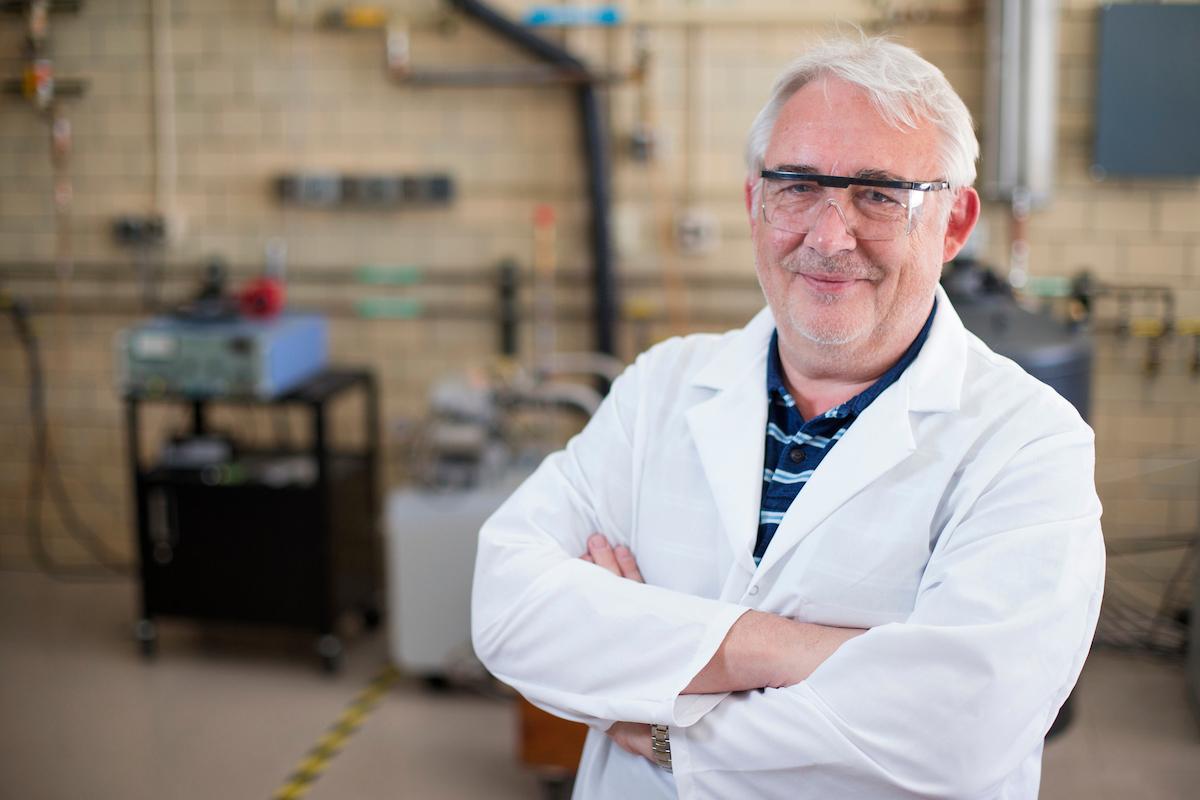
Vitalij K. Pecharsky: How scientific legacy lives on
One year ago, Vitalij K. Pecharsky, senior scientist and Anson Marston Distinguished Professor of Engineering, died unexpectedly. In addition to the tremendous loss felt by his family and friends, Vitalij left behind a robust research endeavor in Ames Lab’s Division of Materials Sciences and Engineering, and numerous fellow scientists who worked for and with him in the areas of rare earth elements, caloric materials and systems, and materials for energy conversion and storage.
For Vitalij’s colleagues, the year since his passing has been about preserving his legacy and the future of the science that he cared about. But it has also been a period of reflection upon his significant contributions and the strength of his leadership and mentorship.
The death of a principal investigator isn’t as uncommon as it might seem; however, there’s frequently little precedent in most organizations for how to handle such a loss.
“Imagine, if you will, the unexpected loss of a seasoned captain on a ship,” said Critical Materials Innovation Hub Scientist Ihor Hlova of Vitalij. “The crew is experienced and the vessel is sturdy. But, suddenly, there's a realization that the security once provided by the captain is gone.”
“There is shock and grief, and a strong sense of loss,” said Yaroslav Mudryk. “At first, the personal sense takes over, especially for those who have known him for many years. Then the doubts related to work start to creep in: how could we possibly continue to do what we did without him? Vitalij was a master of strategy and usually had a plan for everything.”
To preserve the momentum of Vitalij’s research beyond his lifetime, Ames Lab leadership and Vitalij’s researchers worked together to reorganize efforts into three groups, each with its own principal investigator. They are:
- Extraordinary Responsive Magnetic Rare Earth Materials, led by Yaroslav Mudryk. The team includes scientists Anis Biswas and Deborah Schlagel; post-docs Rajiv K. Chouhan and Ajay Kumar; Ph.D. student Kyle Dixon-Anderson; and Senior Technician Roger Rink. The group synthesizes and studies rare earth materials and alloys and their physical properties, especially ones that show strong reactions to external forces like magnetic fields.
- Critical Materials Innovation Hub projects on Li extraction and permanent magnet development, led by Ihor Hlova. The team includes post-docs Rambabu Kuchi and Tyler Del Rose; Technician Jordan Schlagel; and undergradute student Taylor Schlagel. Because rare earths and other critical materials like lithium are necessary for many clean energy technologies and in short supply, this group is developing new permanent magnet materials; extracting rare earths and lithium from hard rock minerals; recycling magnets and batteries; and diversifying the supply chain to ensure sustainability.
- Caloric Demonstrations, led by Julie Slaughter. The team includes scientists Agata Czernuszewicz and Lucas Griffith, and Senior Technician Roger Rink. The group’s focus is demonstrating the real-world potential of new materials and technologies; using magnetocaloric materials and magnets in devices for refrigeration; and cooling and heating with higher efficiency and lower carbon emissions than today’s appliances.
The most important thing about carrying Vitalij’s legacy forward, said Mudryk, is that the research never stopped. Vitalij was known for his strong passion for magnetic refrigeration technology and was rather impatient to see how slowly it was maturing. He recognized three major areas where progress was needed: better magnetocaloric materials, more efficient and robust refrigerator designs, and an abundant supply of strong permanent magnets. Eventually, he established all three research directions at Ames National Laboratory. The teams continue to advance the science.
“Most of the research papers that we are publishing now – he was at least aware of the results," said Mudryk. “He was really looking towards the results from the new pulsed laser deposition system and the news that we can now obtain clean films of rare earth intermetallic compounds would make him very excited, because they open new opportunities for scientific innovations in magnetic rare earth systems.”
Hlova said that he thought Vitalij would take pride in seeing efforts expanded even further into the critical materials realm, as they pursue new directions that build upon the foundations he laid.
Slaughter added: “Some projects take a long time to go from a great idea to a funded proposal and successful research and Vitalij understood the patience and effort that it takes. One endeavor that Vitalij would be excited to see move forward after years of effort is our newly-funded elastocaloric cooling project.”
In addition to the strong scientific direction that Vitalij Pecharsky provided his researchers, they all remember him as a valuable mentor who cared deeply about his colleagues and their success.
“Vitalij always found time to listen – whether you had a sticky technical question, needed a second opinion, or were struggling with personal issues,” said Slaughter. “He was a great scientist, mentor, and friend.”
Scientist Agata Czernuszewic agreed. “Vitalij made sure we felt appreciated for our efforts at all times. He often emphasized to us and others, including lab visitors, how much he enjoyed working with our group and how important he believed our contribution was to caloric research. It was an absolute pleasure working with him.”
Technician Roger Rink is the most senior team member of Vitalij’s research efforts, and was instrumental in keeping the work progressing over the past year.
“As sudden as Vitalij’s passing was, I am grateful that I’ve been able to work with him for as long as I have,” he said. “That was perhaps his greatest strength. I never felt that I was working for him, instead it was always a collaboration where any input was valued and considered. Making things work has always been a challenge I’ve enjoyed and that synergized well with Vitalij’s constant forward view. We all should strive to match the hope and humor that was Vitalij’s approach to both his life and his research.”
Mudryk also noted Vitalij’s stature in the scientific community. “He will be most remembered as one of the founding fathers of room temperature magnetic refrigeration. But he also was a longtime editor of the Handbook of Physics and Chemistry of Rare Earths, and the Editor-in-Chief of the Journal of Alloys and Compounds, establishing his legacy as an advocate for the science of rare earth intermetallic compounds.”
Ames Lab leadership credits Vitalij’s vision as a scientist and his abilities in mentoring for the strong position that his research is in now.
“What made Vitalij extraordinary is that he led science in multiple fields and developed strong leadership across different people with different skills and passions,” said Chief Research Officer James Morris. “We are fortunate to have leaders like Yaroslav, Julie, and Ihor, and are fortunate to have them learn scientific leadership from someone that so reflected Ames National Laboratory values.”
The teams are confident that not only is Vitalij’s life’s work in good hands, it is leading onward to new discoveries and new research pursuits. They credit him for that as well. “Borrowing from the captain and ship metaphor again-- as scientists our beacon may be gone but we’re not without light,” said Hlova. “We've been armed with years of experience and expertise that the captain taught us well. And with that knowledge we are carrying on.”
2023 Holiday auction raises $4,600 for United Way, Bethesda Food Pantry
The annual Ames National Laboratory Holiday Auction, held Dec. 6, raised $4,600, which was split equally between United Way of Story County and the Bethesda Food Pantry. Seventy-three (27 live auction, 46 silent auction) items were donated from lab personnel and community partners.
Ames Lab also collected 133 winter-weather items (53 Hats, 76 pairs of gloves, two scarfs, one pair of socks, and one blanket) that will be distributed locally to individuals who need them.
Additionally, Ames Lab employees raised $29,432.34 for Story County United Way through the annual campaign. This represents over 118% of our United Way annual fundraising goal of $25,000 and sets a new record for Ames Laboratory's annual donations. Iowa State University was also able to raise 102% of their total $400,000 United Way fundraising goal for the year.
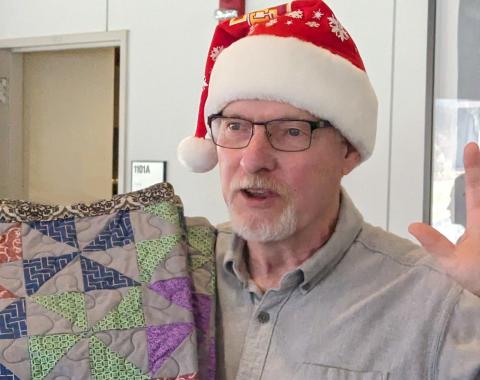
Ames Lab retiree Dale Meyer returned as auctioneer for the live event.
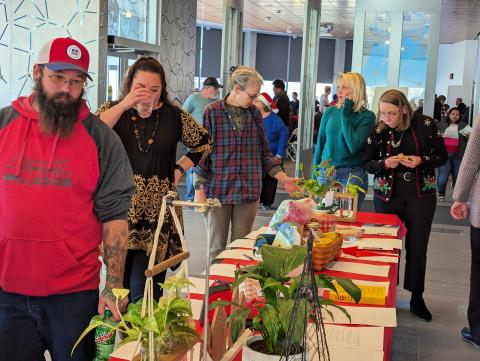
Ames Lab employees contributed over forty silent auction items to the annual fund-raising effort.
Department of Energy announces Early Career Research Program for FY 2024
Today, the U.S. Department of Energy (DOE) announced it is accepting applications for the 2024 DOE Office of Science Early Career Research Program to support the research of outstanding scientists early in their careers. The program will support over 80 early career researchers for five years at U.S. academic institutions, DOE national laboratories, and Office of Science user facilities.
Pre-applications are mandatory and are due on Tuesday, Jan. 30, 2024, at 5 p.m. ET. Applications will be due on Thursday, April 25, 2024, at 11:59 p.m. ET. Only those applicants that receive notification from DOE encouraging a formal application may submit full applications.
A webinar on this opportunity will be held on Jan. 10, 2024, at 1 p.m. ET. Please register here.
Further information can be found on the Office of Science funding opportunities page.
New chemical inventory system launching in February
The lab’s new chemical inventory system, SafetyStratus, will be live for researchers on February 5, 2024. If you have a chemical inventory that previously resided in Quartzy or Excel, that will be available in SafetyStratus for you to review and validate.
Researchers will be able to make updates to their inventories anytime in the new system. Environmental Safety and Health (ESH) staff will serve as the system administrators, which will allow them to run reports, generate safety signage, and add users.
In addition to providing a written user guide, we will have hands-on virtual training during that first full week of February and record it for future reference. ESH team members will also host open office hours in the following weeks to answer questions and provide support.
Visit this article in ServiceNow to learn more, and watch for additional information and training details soon.
Ames Lab Blood Drive: January is National Blood Donor Month
Ames National Laboratory is proudly partnering with the American Red Cross to host our winter blood drive on Monday Jan. 8.
Whether you are an experienced or first-time donor, here are five reasons to donate blood this month: 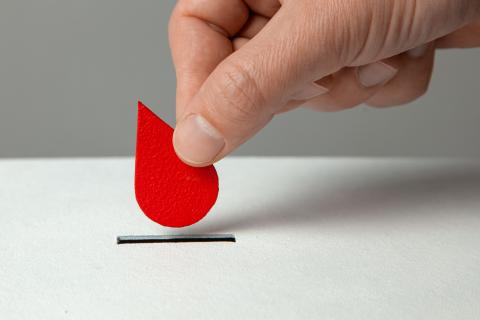
- Winter Blood Shortages: The winter season sees a decline in blood donations due to inclement weather and cold/flu season which ultimately leads to shortages. The decline becomes concerning for hospitals when the need for blood remains high.
- Holiday Season: The holiday season coupled with winter months often means fewer donations due to busy schedules and travel. Unfortunately, this time is also when accidents and emergencies tend to increase, further stressing the already limited blood supply.
- Diverse Blood Needs: Blood is not just for emergencies! Blood products are essential for individuals undergoing cancer treatments, suffering from chronic illness, undergoing surgery, or premature births. It may be your friend or loved one. A consistent supply of various blood products is crucial to meet these needs.
- The Gift of Life: Donating blood is often referred to as the gift of life. A single donation can save up to three lives, what better way to make a meaningful impact this holiday season!
- Benefits for Donors: Besides helping others, blood donors benefit from health screenings which may uncover health issues related to cardiovascular health and certain illnesses. Early detection is key to improving health outcomes.
Additionally, if you schedule a donation at our upcoming blood drive Jan. 8 you will be automatically entered for a chance to win an exciting trip for you and a guest to Super Bowl LVIII in Las Vegas!! This includes travel, hotel, $1,000 gift card, pre-game activities and more!
The need for blood doesn’t pause and is needed now more than ever. We encourage healthy adults of all blood types to donate! Step off the sidelines and roll up your sleeve to help patients in need.
Drive Details:
Location: 301 Spedding Hall
Date: Monday, Jan. 8
Time: 10 a.m. - 3 p.m.
Schedule your Donation appointment HERE.
Appointments preferred. Trouble getting signed up? Stop by G11 TASF to make one.
Unable to donate? Volunteer to help or spread the word by sharing our need with your fellow colleagues! Volunteers may sign up HERE.
SULI hosts two students for fall semester
Ames National Laboratory hosted two students for the fall semester of the Science Undergraduate Laboratory Internship (SULI) Program. The program began in August and ran through Dec. 8. Diana Castillo joined the lab from California, and was mentored by Damien Culver.
“Diana got a new project off the ground and made significant headway on the project during her time here, and I expect her contributions will be included in a future publication as a result, said Culver. “Diana is a fantastic person and chemist, and we were fortunate to have her in our lab as part of the SULI program.”
Daniel Labuda joined the lab from Illinois and was mentored by Alex Travesset.
“Daniel came with no experience in computer simulations and worked very hard to complete state of the art numerical work exploring the interaction between nanoparticle functionalized with polymers, water and electrolytes,” said Travesset
The students gave their poster presentations at separate events to their respective working groups.
Education and Outreach thanks both Damien Culver and Alex Travesset for their time and commitment to the SULI program.
Mentor Damien Culver and SULI student Diana Castillo
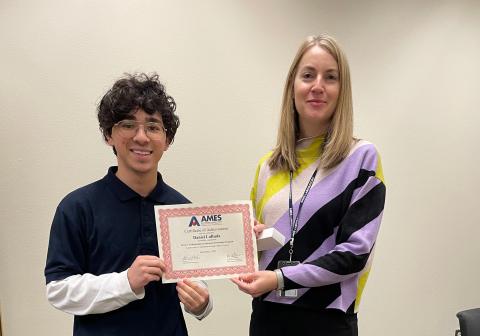
SULI student Daniel Labuda and Education and Outreach Specialist Kelly Bergman
Coming soon: A new way to request support from ESH
Soon you will be able to submit requests to Environmental Safety and Health (ESH) through ServiceNow, similar to Facilities and Engineering Services (FES) and IT requests. The new form will include options for general non-emergency requests to ESH, such as fume hood checks and ergonomic surveys.
ESH is collaborating with the IT Business Applications team and the Process Improvement Champions Team (PICT) to design and test the form, which will launch for lab-wide use in early 2024. Watch for more information soon.
Suggestion box updates available
Thanks to everyone who has taken time over the past year to provide feedback and suggestions to continue to strengthen the Laboratory. Each suggestion is evaluated by the Executive Council to determine any potential next steps. Since many of these are submitted anonymously, we’ve been committed to providing periodic updates, so the initial submitter (along with others) knows what the conclusion was. If you have any questions, please feel free to reach out to Adam, Chelsey, Jamie, or Steve.
Note: In many cases the suggestions have been edited for length or clarity, or to preserve the anonymity of the person making the suggestion. To access a chart of completed and ongoing suggestions, please go HERE.
Announcements
All-employee emails for facilities updates stop this month
Subscribe to new building-specific notifications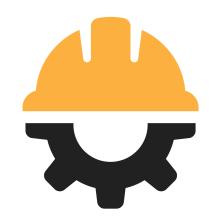
December is the last month we will send emails to all employees for all proposed and upcoming maintenance and closures in Ames Lab facilities. Subscribe to new building-specific facilities notifications to stay updated on the buildings relevant to you.
If you already subscribed to the new updates, you may receive duplicate messages through the end of the month. After this, all-employee emails for facilities updates will stop, with the exception of maintenance or closures to roads, sidewalks, and parking lots near buildings where Ames National Laboratory employees work.
For questions, please contact Payton Crilly: pwcrilly@ameslab.gov.
TASF 140 will be temporarily unavailable Jan. 22-March 5
TASF 140 will be unavailable to reserve or utilize from Monday, Jan. 22 - Tuesday, Mar. 5. The room will be utilized by Education & Outreach to prepare and organize for the Science Bowl competitions. Education & Outreach will be relocating to the third floor TASF in the upcoming weeks, so this will prevent them from needing to relocate all of the Science Bowl materials and equipment mid-competition.
